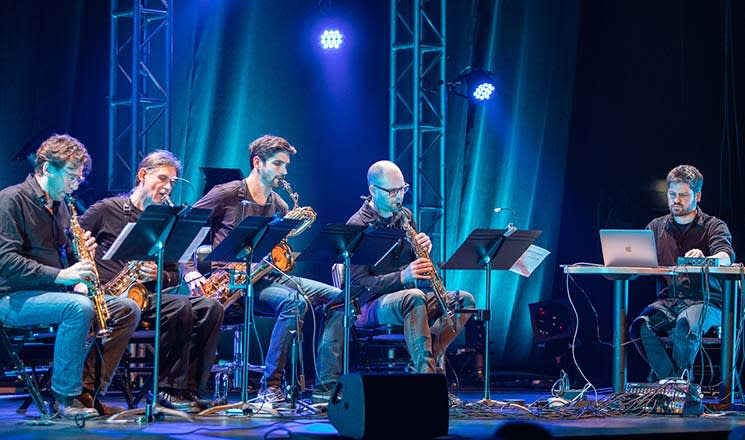While deliberate and considered are not alien adjectives to apply to many performances at FIMAV, few this year earned them as thoroughly as the collaboration between Swiss saxophone quartet Konus and fellow countryman, electronics artist Tomas Korber, with whom they´ve collaborated for over five years now.
Performing a piece entitled "Anschlussfehler" (or "Continuity Errors") composed by Korber, each member of the quartet in turn provided a particular element of sound, channelled through their instruments, then funnelled into Korber`s computer, where he performed real-time processing.
The resulting sound varied between pointillist high frequencies, low churning noises akin to engines and occasionally, when the group performed as a unit, something approaching the glitch rhythms of minimalist dance music.
The choice to constrain the players to mostly breath and plosive sounds before applying the technology resulted in only a mildly satisfying translation — not unlike turning colloquial language or slang into Shakespearean English. Certainly it provided a notable alteration, but not a vast change in apprehension. Very few actual notes ever escaped the instruments, and those that did sounded like they were attempting to escape the engine assembling to trap them. In the end, the experience was more of a brain than a gut punch.
Performing a piece entitled "Anschlussfehler" (or "Continuity Errors") composed by Korber, each member of the quartet in turn provided a particular element of sound, channelled through their instruments, then funnelled into Korber`s computer, where he performed real-time processing.
The resulting sound varied between pointillist high frequencies, low churning noises akin to engines and occasionally, when the group performed as a unit, something approaching the glitch rhythms of minimalist dance music.
The choice to constrain the players to mostly breath and plosive sounds before applying the technology resulted in only a mildly satisfying translation — not unlike turning colloquial language or slang into Shakespearean English. Certainly it provided a notable alteration, but not a vast change in apprehension. Very few actual notes ever escaped the instruments, and those that did sounded like they were attempting to escape the engine assembling to trap them. In the end, the experience was more of a brain than a gut punch.
